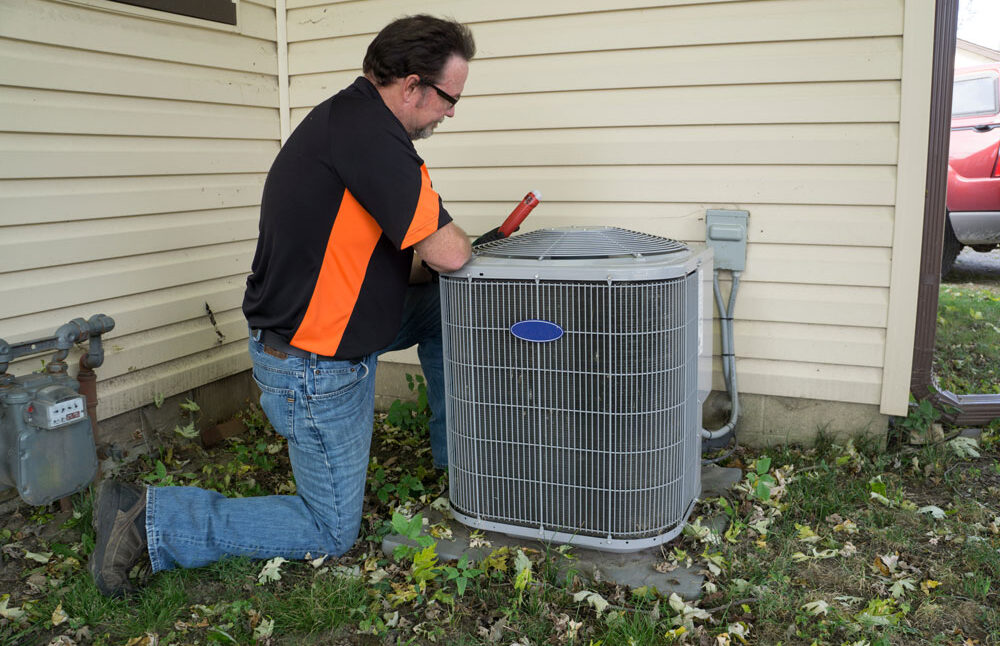Air conditioners use refrigerant to produce cool air. Unfortunately, refrigerant leaks are common, especially in older AC units. If the air conditioner in your Boston home has a refrigerant leak, there are several warning signs.
Catching and repairing AC refrigerant leaks early is crucial, as left unchecked, leaks can cause complete AC failure.
If you believe your air conditioning unit is leaking refrigerant, call the network of contractors affiliated with HVAC 911 Boston at 617-958-2450.
Higher electric bills
One of the first signs of a refrigerant leak is increased electricity usage. As refrigerant leaks out, your AC works harder to try to cool your home, using more energy. You will notice your electric bills creeping up higher than usual during AC season.
With less refrigerant in its system, your AC can not cool efficiently, and the unit will constantly run to try to reach the set temperature, overworking itself and driving up costs. Do not ignore a spike in your electric bills — have a certified technician inspect for leaks.
Reduced airflow
If your AC unit has a leak, you may notice the vents in your home are blowing less cool air than normal throughout your home.
A lack of refrigerant means the air conditioner can not properly create cool air, so less air overall will flow through your ducts. You may notice certain rooms are not getting as cool as they should. Poor airflow is almost always caused by an underlying issue, such as a leak.
HVAC technicians have advanced tools to test system pressures and find leaks so cold air can flow properly again.
Intermittent operation
Does your AC work well for a while but then completely stop blowing cold air? This type of intermittent operation points to a refrigerant leak.
Over time, the refrigerant leaks out and there is not enough left in the system for the AC unit to function. Your air conditioner will run for a while until the pressure gets too low, then shut off to prevent damage. Once some refrigerant returns to the compressor, the unit starts working again, until it runs out and the process starts over.
These on-again, off-again symptoms mean your AC needs a refrigerant recharge. HVAC 911 Boston technicians can pinpoint any leaks and get your system recharged, so it runs smoothly.
Frost buildup
Notice icy frost building up on the copper lines leading to your exterior AC unit? This usually signals a major refrigerant leak. The frost forms because the refrigerant escapes as cold vapor. As the vapor cools the copper tubing to extremely low temperatures, moisture from the air condenses and freezes.
Too much frost buildup can actually block the remaining refrigerant from flowing properly. Left alone, it can damage the AC system.
HVAC technicians have advanced digital gauges to locate the source of any leaks causing frost buildup. They can safely perform repairs, unfreeze the lines and get your AC back to peak condition.
High humidity inside
Does your home feel muggy, humid and generally uncomfortable when your AC is running? Are all your settings correct but your indoor air still feels damp and heavy? Humidity is another clue a serious refrigerant leak may be present.
Air conditioners do not just lower air temperature – they also actively remove humidity from indoor air. If your system cannot properly dehumidify, low refrigerant is often to blame. Do not let high indoor humidity ruin your summer; HVAC technicians can diagnose leaks and restore comfortable dry air.
Strange noises
Listen closely to your interior AC unit while it is running. Do you hear odd gurgling, whooshing or high-pitched squealing? How about loud banging or clanking noises? Unusual sounds usually mean low refrigerant due to leaks.
If there is not enough refrigerant, the AC compressor will strain to run, and all the internal components will clatter around haphazardly. As it erratically starts and stops, you may hear odd noises. Refrigerant leaks can also cause refrigerant lines to rattle or vibrate.
Strange noises signal it is time to call in a professional HVAC technician.
Do not ignore leak signs
It is crucial to catch refrigerant leaks early. If left unchecked, all the refrigerant can eventually leak out, making cooling impossible. A low amount of refrigerant will strain the AC compressor, significantly shortening its lifespan.
Trust certified HVAC technicians to correctly diagnose and pinpoint the source of any refrigerant leaks
HVAC 911 Boston is a referral service affiliated with the top local licensed, bonded and insured HVAC contractors in the Boston area. They employ highly qualified service technicians who receive over 10,000 hours of training and undergo rigorous background checks.
